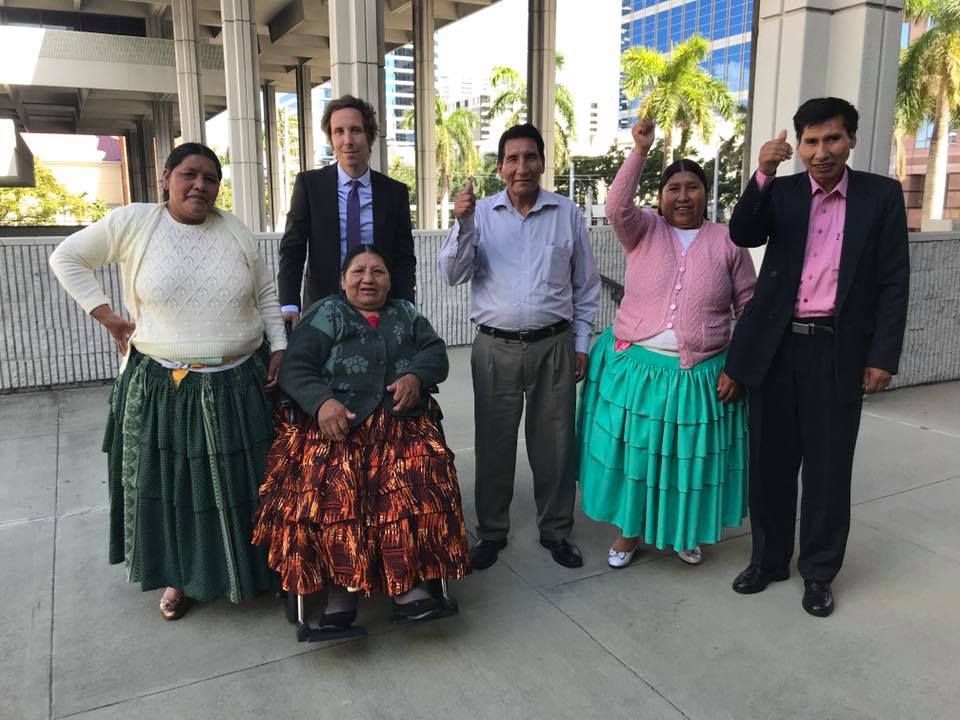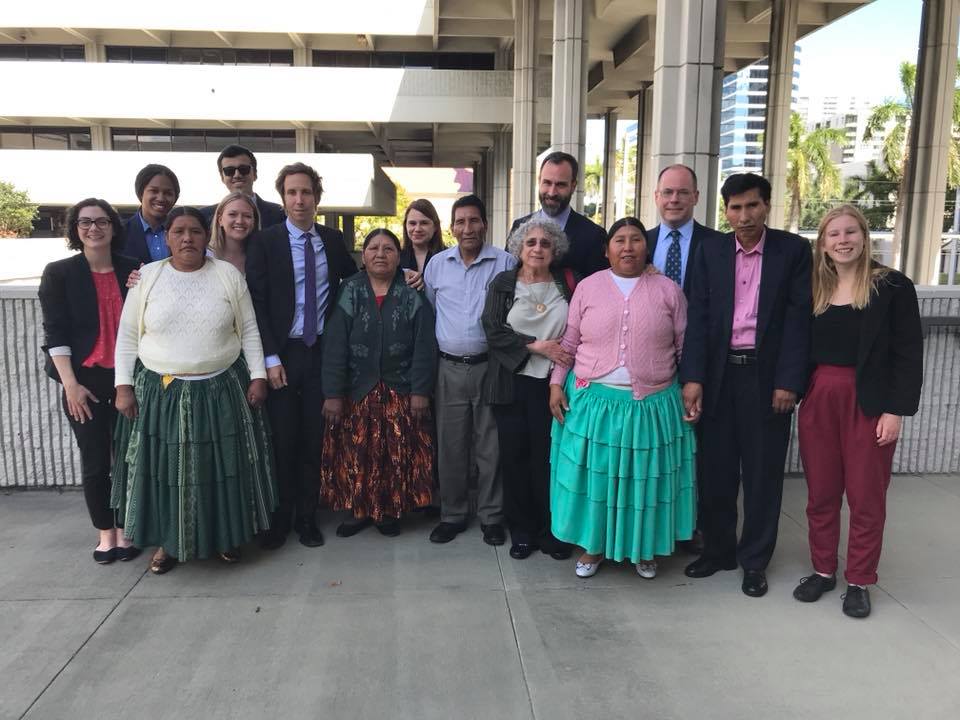In a landmark decision today, a federal jury found the former president of Bolivia and his minister of defense responsible for extrajudicial killings carried out by the Bolivian military in September and October 2003. The decision comes after a ten-year legal battle spearheaded by family members of eight people killed in what is known in Bolivia as the “Gas War.” It marked the first time in U.S. history a former head of state has sat before his accusers in a U.S. human rights trial. The jury awarded a total of $10 million in compensatory damages to the plaintiffs.
Both the former Bolivian president, Gonzalo Sánchez de Lozada, and his former defense minister, José Carlos Sánchez Berzaín, have lived in the United States since they fled Bolivia following the massacre known as “Black October.” During that period, more than 50 people were killed and hundreds were injured. In Bolivia, in 2011, former military commanders and government officials who acted under Sánchez de Lozada and Sánchez Berzaín’s authority were convicted for their roles in the killings. Both Sánchez de Lozada and Sánchez Berzaín were indicted in the same case, but could not be tried in abstentia under Bolivian law.
The lawsuit originated from a collaborative effort between the Harvard Law School International Human Rights Clinic and Bolivian lawyers, advocates, and community members seeking justice for the 2003 violence. Dozens of clinical students have worked on the case since 2006.
“After many years of fighting for justice for our family members and the people of Bolivia, we celebrate this historic victory,” said Teófilo Baltazar Cerro, a plaintiff and member of the indigenous Aymara community of Bolivia, who were victims of the defendants’ decision to use massive military force against the population. “Fifteen years after they fled justice, we have finally held Sánchez de Lozada and Sánchez Berzaín to account for the massacre they unleashed against our people.”
In Mamani v. Sánchez de Lozada and Sánchez Berzaín, the families of eight Bolivians who were killed filed suit against Sánchez de Lozada and Sánchez Berzaín in 2007. Today’s verdict affirms the plaintiffs’ claims that the two defendants were legally responsible for the extrajudicial killings and made decisions to deploy military forces in civilian communities in order to violently quash opposition to their policies.

“To me, it was the biggest honor of my life to work with the plaintiffs and learn from them in their struggle for justice,” said Thomas Becker ’08, who brought the idea for the lawsuit to IHRC after spending time in Bolivia and learning about the massacre there. “It’s an extraordinary privilege to witness this and be a small part of this.”
The three-week trial included the testimony of 29 witnesses from across Bolivia who recounted their experiences of the 2003 killings. Twenty-three appeared in person. Eight plaintiffs testified about the deaths of their family members, including: Etelvina Ramos Mamani and Eloy Rojas Mamani, whose eight-year-old daughter Marlene was killed in front of her mother when a single shot was fired through the window; Teófilo Baltazar Cerro, whose pregnant wife Teodosia was killed after a bullet was fired through the wall of a house; Felicidad Rosa Huanca Quispe, whose 69-year-old father Raul was shot and killed along a roadside; and Gonzalo Mamani Aguilar, whose father Arturo was shot and killed while tending his crops. One witness, a former soldier in the Bolivian military, testified about being ordered to shoot at “anything that moves” in a civilian community, while another recounted witnessing a military officer kill a soldier for refusing to follow orders to shoot at unarmed civilians. Witnesses recounted how tanks rolled through in the streets and soldiers shot for hours on end. Others testified about how the president and minister of defense committed to a military option instead of pursuing dialogue with community leaders to reach a peaceful resolution.
In 2016, a U.S. appeals court held that the plaintiffs could proceed with their claims under the Torture Victim Protection Act (TVPA), which authorizes suits for monetary damages in U.S. federal court for extrajudicial killings. Sánchez de Lozada and Sánchez Berzaín then sought and were denied a review by the U.S. Supreme Court in 2017, and the case moved forward in U.S. District Court. After a review of the evidence gathered by both sides, District Court Judge James I. Cohn ruled on February 14 that the plaintiffs had presented sufficient evidence to proceed to trial.
“There are just no words for what the plaintiffs have done over the past ten years to seek justice for their lost loved ones as well as many others who were killed in Bolivia,” said Tyler Giannini, Co-Director of Harvard Law School’s International Human Rights Clinic. “Today the jury gave the plaintiffs a huge victory, and showed that the former president and his defense minister are not above the law.”
“When I heard the verdict, I almost couldn’t believe it,” added Susan Farbstein, Co-Director of Harvard Law School’s International Human Rights Clinic. “The only thing I could think of was: We didn’t let down the plaintiffs, we didn’t disappoint them, we did our jobs.”
As co-counsel, Harvard Law School’s International Human Rights Clinic has been involved in all phases of the litigation from the outset, including researching and drafting for the complaint and various motions and briefs, assisting with oral arguments, and undertaking more than a dozen investigative missions to Bolivia since 2007. Over the past year, during the discovery phase, students traveled to Bolivia numerous times, and assisted with document review, interrogatories, and the depositions of plaintiffs, witnesses and experts; more than a half dozen students worked on every facet of the case during the three weeks of trial.
“It was fascinating to work under the legal team and have complete faith in their talent and ability to manage such a complex case,” said Amy Volz ’18, who traveled to Bolivia on four fact-finding trips. “It was a once-in-a-lifetime opportunity.”
After the jury announced its verdict, the defendants made a motion asking the judge to overturn the jury’s finding of liability against both defendants. Both parties will submit briefing on this issue in the coming weeks.
“We’re not one to leave halfway through the fight,” said Baltazar Cerro. “We will struggle until the last moment.”
In addition to Harvard Law School’s International Human Rights Clinic, a team of lawyers from the Center for Constitutional Rights and the law firms of Akin Gump Strauss Hauer & Feld LLP, Schonbrun, Seplow, Harris & Hoffman, LLP, and Akerman LLP are representing the family members. Lawyers from the Center for Law, Justice and Society (Dejusticia) are cooperating attorneys.
